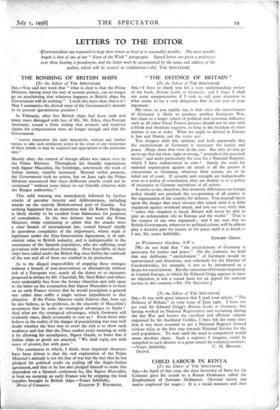THE BOMBING OF BRITISH SHIPS
LETTERS TO THE EDITOR
- [Correspondents aro requested to keep their letters as brief as is reasonably possible. The most suitable length is that of one of our " News of the Week" paragraphs. Signed letters are given a preference over those bearing a pseudonym, and the latter must be accompanied by the name and address of the author, which will be treated as confidential.—Ed. THE SPECTATOR] [To the Editor of THE SPECTATOR} SIR,—You said last week that " what is clear is that the Prime Minister, having tried the way of normal protest, can no longer go on proclaiming that whatever happens to British ships the Government will do nothing." I wish this were clear, but is it ? May I summarise the dismal story of the Government's descent to its present ignominious position ?
In February, after five British ships had been sunk and many more damaged with loss of life, Mr. Eden, then Foreign Secretary, issued a Note stating that protests and reserved claims for compensation were no longer enough and that the Government " reserve themselves the right henceforth, without any further notice, to take such retaliatory action in the event of any recurrence of these attacks as may be required and appropriate to the particular case."
Shortly after, the control of foreign affairs was taken over by the Prime Minister. Throughout his friendly negotiations with Signor Mussolini, the bombings, notoriously the work of Italian airmen, steadily increased. Beyond verbal protests, the Government took no action, but on June 14th the Prime Minister announced that these deliberate attacks could not be continued " without some injury to our friendly relations with the Burgos authorities." .
This mild warning was immediately followed by further attacks of peculiar ferocity and deliberateness, including attacks on the entirely British-owned port of Gandia. Yet nothing happened but an intimation that Sir Robert Hodgson is likely shortly to be recalled from Salamanca for purposes of consultation. In the two debates last week the Prime Minister, while continuing to admit that the attacks were a, clear' breach of international law, vented himself chiefly in querulous complaints of the shipowners, whose trade is legitimate under the Non-Intervention Agreement, is of sub- stantial value to British industry, and is indispensable to the sustenance of the Spanish population, who are suffering• cruel privations with marvellous fortitude. Over four-fifths of their ships have .ailed under the British flag since before the outbreak of the war and all of them are entitled to its protection.
As to the alleged impossibility of stopping these outrages without a breach of non-intervention or alternatively without risk of a European war, nearly all the dozen or so measures proposed in debate by Mr. Churchill, Mr. Noel Baker and others were undeniably free from the former objection and only 'open to the latter on the assumption that Signor Mussolini is so bent on an early Franco victory that he would precipitate a general war rather than suffer a single serious impediment to that _ objective. If the Prime Minister really believes that, how can he also believe, as he professes, in the sincerity of Mussolini's assurances that he seeks no strategical advantages in Spain ? And what are the strategical advantages, which Germany will evidently share, lilely eventually to cost us ? Even those who believe in the reality of the danger of precipitating war may well doubt whether the best way to avert the risk is to show such weakness and fear that the Duce canhot resist taunting us with it by allowing his mouthpiece, Signor Gayda, to boast that if Italian ships or goods are attacked, " We shall reply, not with notes of protest, but with guns."
The conclusion to which, I think, most impartial observers have been driven is that the real explanation of the Prime Minister's attitude is not the fear of war but the fact that he has pledged his political credit on pulling off the Anglo-Italian agreement, and that as he has also pledged himself to make this dependent on a Spanish settlement he, like Signor Mussolini, is bent on securing an early Franco win by stopping the food supplies brought in British ships.—Yours faithfully,


















































 Previous page
Previous page